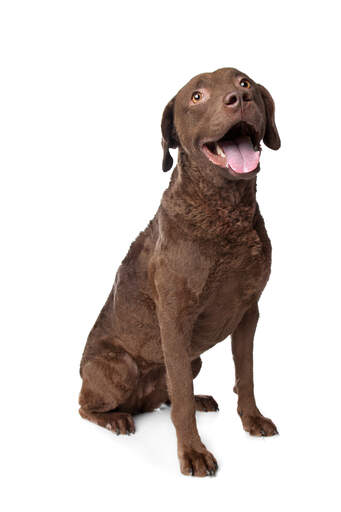Chesapeake Bay Retriever Dogs




History
The Chesapeake Bay Retriever, also known as the Chessie, originally hails from the United States. It was first recognized by the American Kennel Club in 1885. It is believed that this breed was created when two dogs that had been shipwrecked were bred with local retrievers, and soon their reputation as fantastic retrievers started to grow. The Bloodhound, Newfoundland and Irish Water Spaniel are all believed to have been a part of this dog’s development. It is a particularly good hunter of waterfowl.
Behaviour
The Chessie is an intelligent breed with a high work ethic. They usually have an easy going, friendly nature about them. They should not be confused with other retrievers as, despite looking similar to Labradors, they come from a completely different blood line and are completely different. The Chessie will be protective of ones who they are close to and will be naturally wary of strangers. Socialisation whilst still young will help the dogs to an extent, but they will always be somewhat cautious when meeting new people, especially if this new person is in the dog’s “home”. This breed is fine with children and is patient with them, the same will apply to other dogs and cats within the home, if they have been brought up together or the dog has known them from a young age. Overall, the Chessie is a protective, affectionate breed and will placew itself between strangers and peopler it knows, even if just to let the stranger know that they are there and will protect their family if needs be. These dogs smile, showing teeth, when they are happy - this is not a sign of aggression but rather a sign of submissiveness.
Training will take time, but once learnt, this dog won’t forget. The retrieval instinct in these dogs is strong and will help you when teaching as they will always be wanting to bring you things. This could be anything from a pair of socks to a frying pan. Make sure not to leave stuff lying on the floor, as it is very likely that this dog will spot it and scoop it up for themselves. They can be willful and sometimes stubborn, but are eager to please and will love the attention they receive when you praise them. Greed is also a big factor in this breed, so food treats and affection will work well with training.
These are very active dogs and they need lots of exercise. Chessies have a love for water and does best if allowed to swim. These dogs will need long walks each day and if given the chance to go for a swim, well, even better. Anything that floats on water and can be held by the dog will make for a good toy. Even just a simple game of fetch will keep these dogs happy and give them the mental and physical stimulation that they need. Mock (or even real) hunts, retrieval, agility and obedience all help keep the dog fit and healthy. Many of these dogs do well in competitions.
They have a dense coat and require brushing at least a couple of times a week. Bathing these dogs too often will destroy the natural oils in the coat and stop them from being water resistant. Their thick outer coat is crucial in keeping them warm in the freezing waters of their place of origin. You’ll have a hard time getting this dog thoroughly wet. Canine Hip Dysplasia and Progressice Retinal Atrophy can be more common in this breed.
Temperament
Chessies have a rugged and loving temperament. These are powerful dogs with heaps of stamina so daily exercise, again swimming is ideal, is a must if you want your dog to be calm at home. They tend to be reserved when around strangers but are incredibly loyal to their family.
Health Problems
Health problems that may affect Chesapeake Bay Retrievers include canine hip dysplasia (CHD), elbow dysplasia, bloat, epilepsy, eye disease and allergies.
Breed Details
- Status: Common
- Life Expectancy: 10 - 13 years
- Weight: 55 - 80 pounds
- Height: 21 - 26"
- Rare: No
- Coat: Short - Double
- Grooming Requirements: More than once per week
- Town or Country: Country
- Minimum Home Size: Large House
- Minimum Garden Size: Large Garden
- Breed Type: Gun Dog
- Size: Large
- Energy Level: Medium
- Exercise Required: Over 2 hours








